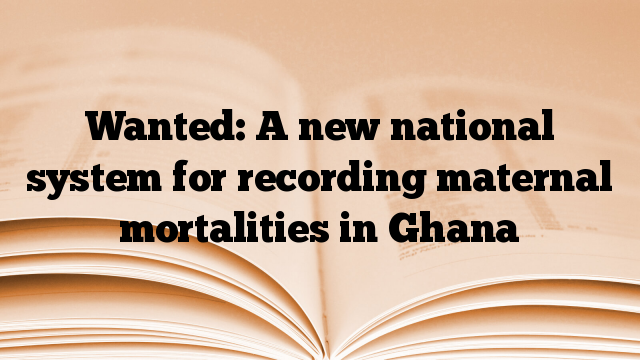Friday, July 30, 2021.
About 8 years ago, a medical superintendent in one of our hospitals in Ghana got very angry with me. An institution had been honoured for having zero maternal mortality in the year. My response (which went viral as usual) was that these awards may not tell the full story on the ground. Before this, many institutions had been commended in a similar manner. It was as if there was a competition to achieve zero maternal mortality every year (which is a good thing). The only problem is that in doing this, some institutions refer patients to die in other institutions just to get clean records, while many of the receiving institutions take the brunt for these maternal mortalities they could not have prevented, and hardly had any chance to prevent. Some of these patients who die spend less than 30 minutes in the receiving institutions after spending many days or weeks in the referring institutions. A senior colleague in a tertiary hospital in Ghana once told me about how they once received a referral from a smaller facility because ‘they did not have a mortuary in their facility’. The smaller facility was expecting the patient to die.
I proposed a new system for recording maternal mortalities in institutions in Ghana about a decade ago and I will revisit it.
Why do I bring this up at this time? I work in a busy district hospital in the Volta Region. We receive referrals from our own region as well as the Greater Accra Region, Eastern Region (and from across the country). This week we’ve had a maternal mortality from a facility in the Greater Accra Region. The woman had a caesarean section in the facility and was referred after a complication. She came to our hospital in shock, with no recordable blood pressure. She died in our hospital less than 5 hours after she arrived in hospital after a repeat surgery. There was hardly anything we could have done to prevent this maternal mortality. In the annual review, this mortality will be against the name of Catholic Hospital, Battor. If there are 10 of these in a year, the first impression when anybody sees the statistics is that Catholic Hospital, Battor is not doing well. The referring institutions may be honoured for recording zero maternal mortality. If one tries to draw attention to this unfairness, a medical superintendent or a politician may describe it as ‘sour grapes’.
It is interesting to note that the same facility that referred this last woman referred another woman to us just a couple of weeks ago. The woman died on the way before she got to our hospital. How should this maternal mortality be captured? By the facility in Greater Accra Region or by our facility in Volta Region?
This piece is not meant for ‘witch hunting’ but to draw attention to real challenges on the ground. When mortalities that are caused in one region are recorded in another region, it gives a poor picture about where to direct resources to solve the problems.
What new system of recording maternal mortality do I propose? An audit team from both referring and receiving institutions must audit these mortalities as much as possible. If the conclusion is that there is no way the receiving institution could have prevented the mortality, it should reflect in the reporting system. The referring institution should also have a record of this maternal mortality. So in this case, if Catholic Hospital, Battor had 2 institutional maternal mortalities before this patient came to die, the record of Catholic Hospital, Battor will be 3 – 1 (3 minus 1). If the referring institution did not have a maternal mortality before this death, its record will be 0 + 1 (0 plus 1).
When we do this, at a glance we can have an idea about the institutions that are recording maternal mortalities in Ghana, as well as the institutions that are not recording maternal mortalities but referring patients to die in other institutions. Then we shall know where to direct resources to prevent maternal mortalities. We can extend this to neonatal mortalities and others. We need reliable data to solve our problems.
Dr. Kofi Effah is an Obstetrician Gynaecologist in Catholic Hospital, Battor in the North Tongu District of the Volta Region of Ghana.


[…] In my first piece, I wrote: […]